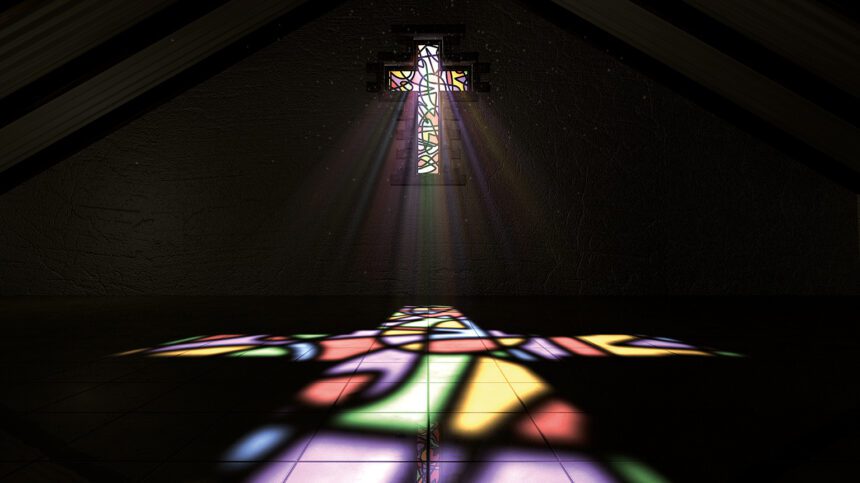Nick Page asks: what do we do when we are holding onto our faith by a thread?
This article was published in the May to August 2022 edition of Rapport magazine.
There comes a day when you look around you in church and ask, ‘Is that it?’

The questions which you used to be able to push to the back of your mind have now made their way centre stage. The worship songs you used to sing quite happily now make no sense. In fact, now you come to think of it, you realise that they never made any sense. Words and phrases which once seemed so profound now have all the depth of a car park puddle. The sermon is a pick and mix selection of clichés, platitudes and fridge-magnet slogans. Your prayer life shrivels up and hides in a corner. You look around the church and say to yourself, ‘Is this it?’
And what makes this even worse, is that you’re the Vicar.
Deep breaths. Stay calm. Don’t panic. You’re just having a mid-faith crisis.
Dangerous isolation
For years I’ve argued that the fastest growing denomination in the UK is Christians who no longer go to church. This was certainly my experience before the pandemic, and the lockdown can only have accelerated the exodus.
There are many reasons why people leave church, but one of the key reasons – at least among the people I encounter at retreats and speaking events – is that church no longer seems able to address their questions and doubts. It’s not that they have stopped believing in God; it’s that they’ve stopped believing in the type of God that was being preached from the pulpit or prayed to in the prayers. They would love to have a conversation about their faith: but they don’t want to attend a lecture. They want to follow Jesus, they just don’t want to follow Him into church.
This experience of disconnection, this thirst for something deeper, something different, is why my friend Joe Davis and I launched the Mid-faith Crisis podcast. Here’s how we describe the podcast to the wider world:
‘Mid-faith Crisis is a podcast for every Christian who has ever asked “Is that it?”
If you feel that you have more questions than answers, if you feel as though your faith is changing, if you feel that if the worship leader sings that chorus one more time you will strangle him with his own guitar strap, then this is the podcast for you.’
We kept meeting people – both clergy and laity – who felt themselves drifting away from the established church. And we wanted to do two things. First, we wanted to create a community where we could talk about these questions. Personally, I think that as Christians, we need a community of believers around us. We need a ‘church’ whatever that looks like. There are Christians in the world who have to live secret, isolated lives, but that’s an emergency measure. It’s not good for them. The mid-faith crisis can be a lonely, isolated place. We want our listeners to know that they are not alone.
Safe space
Second, we wanted to validate their experience. In church, those who start to question or wonder can find themselves labelled. I remember very well talking about my questions to someone at church many years ago, and being met with a worried look and a hushed question: ‘You’re not backsliding are you?’ (If only they knew. I mean, if backsliding was a sport I could have been Olympic champion.) Say these things out loud and people will often try to fix you: they’ll offer you books to read, maybe some prayer ministry, or possibly an exorcism or two.
But it’s perfectly normal to have doubts about the faith. It’s biblical. The Bible is full of people who ask questions of God. Even with the risen Jesus in front of them some of the disciples doubted (Matthew 28:17). Doubt is not a sin. Doubt is part of being human. And doubt can lead you deeper.
The hungry caterpillar of faith
Let me refer you to one of the great books of spiritual formation: Eric Carle’s The Very Hungry Caterpillar. In this book, for those of you who haven’t read it, a Very Hungry Caterpillar eats his way across all the pages, consuming everything that comes his way. And then, one day, he wraps himself in a cocoon and goes into meltdown, to emerge a page or so later as a beautiful butterfly.
And, in fact, ‘meltdown’ is literally what happens with caterpillars. They start out as small, hairy tubes of solid appetite and then when they have eaten enough, they turn into a chrysalis. (The name comes from chrysós, the Greek word for gold: it derives from the fact that many butterflies have a kind of metallic gold-colour at this stage.) It looks for all the world as though they are dead, hanging on to the leaf by a thread. And yet, inside, something wonderful is happening: they are starting to dissolve and to reshape.

The journey
And that is the mid-faith crisis. As caterpillars of faith we eat our way through everything: Bible studies, home groups, prayer meetings, worship songs, four hour sermons. Nom, nom, nom; chomp, chomp, chomp. But then the chrysalis stage begins. Maybe events in our life shake our firmly held beliefs. Perhaps crucial prayers go unanswered. Maybe we read the Bible and struggle to believe a word. Maybe we just get bored into immobility. We are left, like the chrysalis, clinging on by a tiny thread.
This is the journey seen in so many ‘heroes’ of the faith. It is Job on the waste tip, scratching himself with bits of pottery and screaming at God; it is the Psalmist crying ‘how long, oh Lord, how long?’; it is Paul being whipped up into what he could only describe as a seventh heaven. It is Thomas Aquinas who, after having penned heaven knows how many thousand words of theology, had an experience so profound that he rarely spoke again. It is John of the Cross, incarcerated in a cell, composing poetry in his head during what he called ‘the dark night of the soul’. It is C.S. Lewis weeping over his wife’s death. (He describes how he did not feel in danger of ceasing to believe in God: ‘The real danger’, he wrote, ‘is coming to believe such dreadful things about him.’)
It feels bad. It feels painful. It feels as though everything is falling apart. It feels like we’re losing everything. But, viewed rightly, it can be a golden moment.
The chrysalis is the ‘is that it?’ moment. It’s a crisis point because it is often at this point that previously deeply committed people are hanging on by a thread. What Joe and I try to do in the podcast is to make sure the thread doesn’t snap. Because we all need help in this moment. We need help to see that often the problem is not God, but what we have been told about him. One of the key messages of the podcast is that we are held by a God who truly, really loves us. When you grasp that, we can accept our vulnerability, our humanity. If God is holding us, we can let go of some of the ideas and convictions which no longer help.
If God is holding us, we can learn to fly.
That’s what the mid-faith crisis is all about. And yes, I know it sounds like we’ve gone all wishy-washy and generally hippy-like, but actually it often comes down to very concrete, definite things. Often it means forgiving people and being forgiven. It means letting go of bitterness. It means not blaming others. Especially not the church. Generally, our church leaders are doing their best. They are coping with numerous crises, spinning a great many plates (and often going through a mid-faith crisis of their own). We need to take responsibility for our own spiritual formation.
That’s the kind of thing that Joe and I talk about in the podcast – and what we’ll be talking about in our time at Lee Abbey. Fundamentally, the way through means rediscovering what it means to follow Jesus. As Michael Ramsay said many years ago:
‘God is Christlike, and in Him there is no unChristlikeness at all.’
Or to put it more simply, as a friend of ours says, ‘Jesus does God perfectly’. Whatever our questions, whatever our fears and doubts, we have the figure of Jesus before us.
Which is not to say it’s simple. Like all of life it gets messy. But I do think that it is a key part of the Christian life and one to which we need to pay a lot of attention. I have met very few truly holy people in my life. But all of them have been wounded, broken. All of them have, in different ways, been through this journey.
And all of them have emerged holding God’s hand.
Nick Page
Nick Page is a writer and speaker. His books include The Dark Night of the Shed, The Badly Behaved Bible and
A Nearly Infallible History of Christianity.
His partner in crime on the Mid-faith Crisis podcast is Joe Davis – speaker, independent celebrant, failed kite-surfer and leader of a Thursday night table fellowship called Soul Place.
